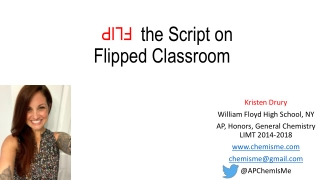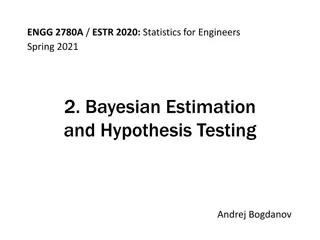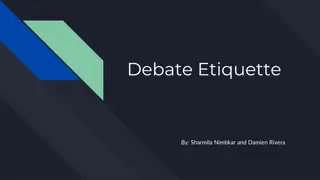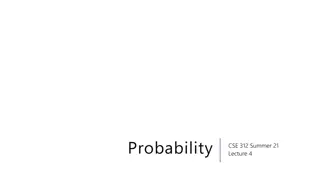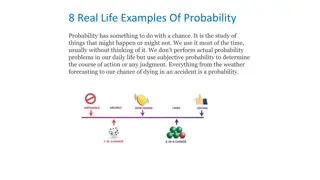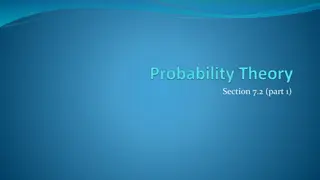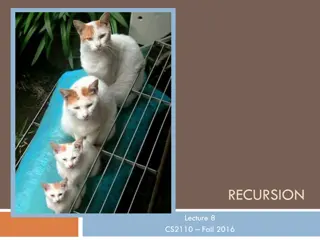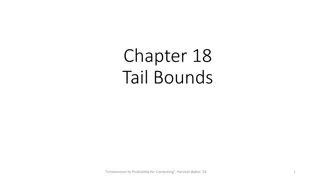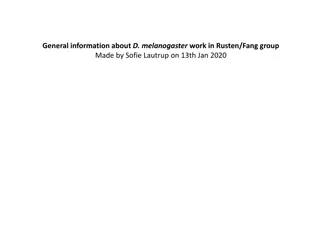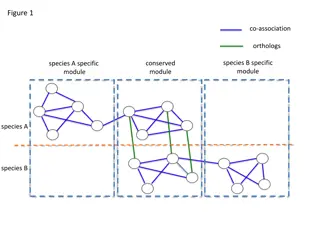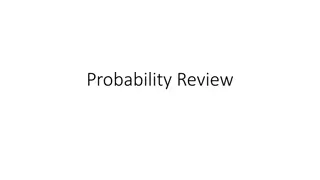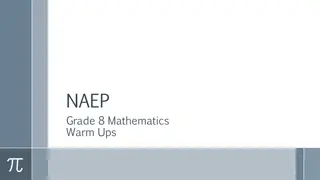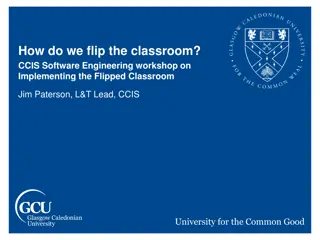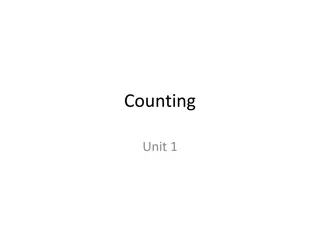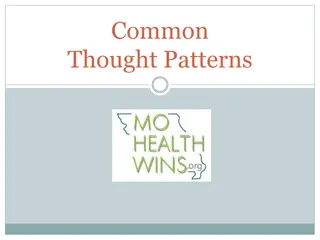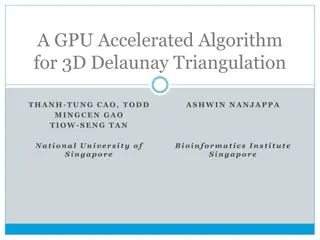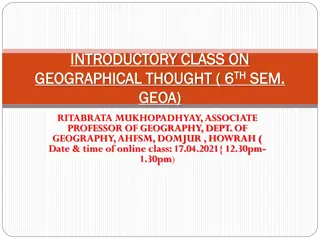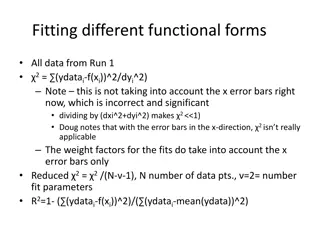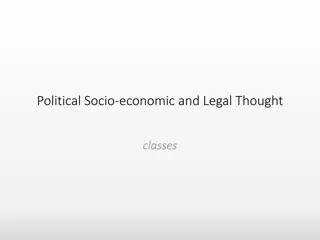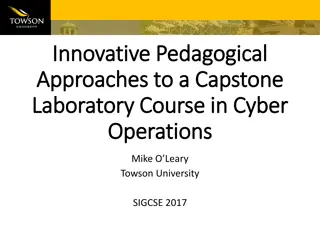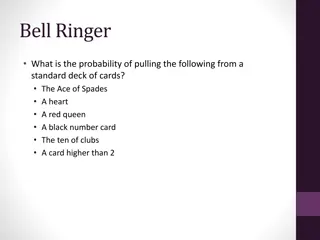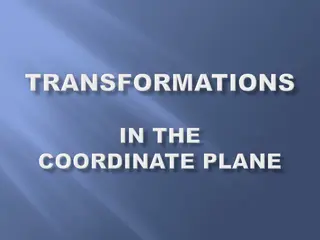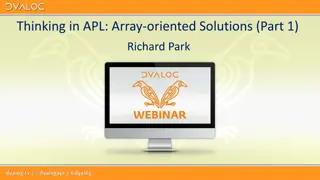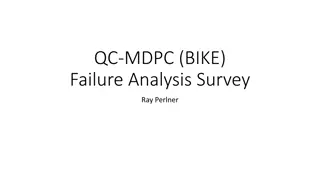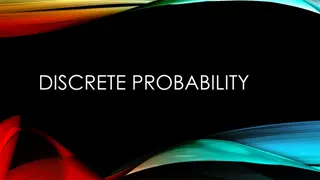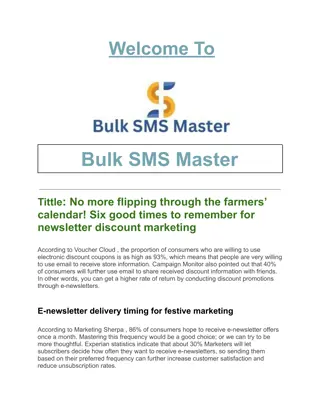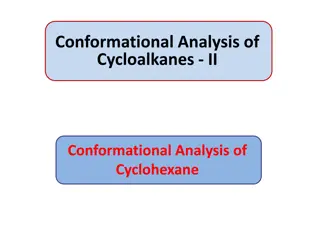Innovative Flipped Classroom Practices: Maximizing Student Engagement
Learn about successful flipping techniques from a chemistry teacher. Discover benefits, misconceptions, and research-based methods for a more engaging classroom.
0 views • 49 slides
Introduction to Probability Concepts in CSE 312 Spring 24 Lecture 5
Today's lecture in CSE 312 Spring 24 covers the basics of probability, including sample spaces, events, and probability calculations. Understand the foundational processes behind quantifying uncertainty, such as flipping coins, rolling dice, and shuffling cards. Dive into concepts like sample spaces
2 views • 26 slides
Bayesian Estimation and Hypothesis Testing in Statistics for Engineers
In this course on Bayesian Estimation and Hypothesis Testing for Engineers, various concepts such as point estimation, conditional expectation, Maximum a posteriori estimator, hypothesis testing, and error analysis are covered. Topics include turning conditional PDF/PMF estimates into one number, es
0 views • 16 slides
Mastering Debate Etiquette: A Comprehensive Guide
Enhance your debate skills with this comprehensive guide on debate etiquette. Learn about pre-debate introductions, flipping the coin, understanding judge paradigms, and in-round etiquette. Discover essential tips for interacting with opponents, making strategic decisions, and maintaining respect th
0 views • 8 slides
Understanding Inertia and Motion in the Moving Earth
Inertia and motion in a moving Earth debunk the argument against Earth's movement using examples of birds catching worms on trees and flipping coins in moving vehicles. Objects on Earth move with Earth's motion, showcasing the principle of inertia in action.
2 views • 7 slides
Understanding Thought Disorders in Psychiatry: Insights from Clinical Meeting Presentation
Explore the definitions and divisions of thought disturbances in psychiatry, including disorders of thought stream, form, content, and possession. Delve into thought stream disorders like tempo and continuity disruptions, as well as form of thinking disorders seen in conditions like schizophrenia. G
1 views • 32 slides
Introduction to Probability and Sample Spaces in CSE 312 Lecture
Today's lecture introduced the concept of probability and its applications in quantifying uncertainty. The session covered foundational processes like flipping a coin, rolling a die, and shuffling cards to demonstrate how to calculate probabilities. Important terms such as sample space and events we
0 views • 29 slides
Real Life Examples of Probability and Its Applications
Probability plays a crucial role in our daily lives, from weather forecasting to predicting election outcomes. This article explores real-life examples like weather forecasting, cricket batting average, political analysis, coin flipping, and insurance planning. Understanding probability helps in mak
0 views • 11 slides
Understanding Probability: Theory and Examples
Explore the concepts of probability through the classical theory introduced by Pierre-Simon Laplace in the 18th century. Learn about assigning probabilities to outcomes, the uniform distribution, and calculating probabilities of events using examples like coin flipping and biased dice rolls.
0 views • 14 slides
Understanding Recursion in CS2110: Fall 2016 Lecture Insights
Covering the concept of recursion in CS2110 Fall 2016 lecture, this content delves into key topics such as base case, Java stack frames, and flipping the class methodology. It emphasizes the importance of hands-on problem-solving for better learning outcomes. The approach of watching short videos an
0 views • 37 slides
Understanding Tail Bounds in Probability for Computing
Tail bounds in probability theory play a crucial role in analyzing random variables and understanding the behavior of certain events. This content explores the concept of tail bounds, their importance through examples, and the derivation of upper bounds on tails. Markov's inequality is also discusse
0 views • 31 slides
Enhancing Alignment Between Introductory Biology and Core Courses
Explore the alignment of the Biology core curriculum, focusing on the structure, goals, and rationale behind flipping portions of the curriculum. Evaluate the preparedness of students for core courses, identify gaps, redundancies, and essential knowledge transfer. Study design involves categorizing
0 views • 25 slides
Guidelines for Working with D. melanogaster in Rusten/Fang Group Lab
Detailed information about working with D. melanogaster in the Rusten/Fang Group lab located at Radium Hospitalet in Oslo. This includes details on lab location, shared facility, resources, food preparation, recipe, cleaning procedures, and flipping frequency for the flies.
1 views • 13 slides
Comparative Genomics Analysis of Co-Association Networks in Species A and B
Explore Figures 1 through 5 depicting a novel method for identifying co-association networks of orthologs between species A and B. The analysis includes optimizing a cost function through simulated annealing, identifying cross-species modules, and assessing network modularity with respect to GO refe
1 views • 17 slides
Understanding Probability: Concepts and Applications
Probability is the likelihood of an event occurring, with theoretical probability based on all possible outcomes and experimental probability based on results. Events can be independent or dependent, impacting subsequent outcomes. Explore vocabulary, scenarios like rock-paper-scissors, and coin flip
0 views • 15 slides
Thought Development Through Creative Tool Innovation
Explore the journey of thought development through the innovative creation of tools like the "Soupstaser" and "Deflagarating Spoon", showcasing the process of schema assimilation and accommodation. Silver, shiny, long cups that are hard to bend, swingable, and durable play a crucial role in this tho
3 views • 9 slides
Morning Math Time: Challenges and Insights in Education
Explore a collection of intriguing math problems, thought-provoking quotes, and interesting math recipes in the context of education. Delve into topics like flipping the classroom, fair distribution of prizes, mathematical methods to divide triangles, and intriguing riddles like coffee and cream mix
0 views • 14 slides
Grade 8 Mathematics Warm-Ups Collection
Collection of Grade 8 Mathematics warm-up exercises covering various math topics such as probability, ratios, coordinates, statistics, geometry, and measurements. The exercises involve coin flipping outcomes, ratio problems, coordinate midpoint calculations, statistical changes, angle measurements,
0 views • 78 slides
Implementing the Flipped Classroom in Software Engineering Workshop
Explore the concept of flipping the classroom in software engineering through the eyes of Jim Paterson, focusing on motivation, implementation strategies, impact on students, and challenges faced. Discover the benefits of introducing learning material before class, allowing more time for in-depth un
0 views • 29 slides
Understanding Counting Principles Through Fun Activities
Explore the concept of counting through various activities like coin flips, sandwich making, and golf orderings. Learn how to use tree diagrams for counting different outcomes and understand the multiplication principle to calculate total possible combinations. Engage with engaging examples like fli
0 views • 22 slides
Understanding Common Thought Patterns in Communication
Common thought patterns in communication help structure messages effectively to increase understanding and engagement. Recognizing these patterns benefits readers by enhancing comprehension, engagement, recall, and writing skills. The five most common thought patterns are list, sequence, definition,
0 views • 16 slides
GPU Accelerated Algorithm for 3D Delaunay Triangulation
Thanh-Tung Cao, Todd Mingcen Gao, Tiow-Seng Tan, and Ashwin Nanjappa from the National University of Singapore's Bioinformatics Institute present a GPU-accelerated algorithm for 3D Delaunay triangulation. Their work explores the background, related works, algorithm implementation, and results of thi
0 views • 24 slides
Introduction to Geographical Thought: Key Concepts and Major Schools
Geographical thought explores the description and interpretation of Earth's phenomena, addressing fundamental questions of geography. It involves concepts such as Earth surface, spatial distribution, areal differentiation, and more. It also delves into the relations with other sciences and social sc
0 views • 21 slides
Understanding Functional Form Fitting in Data Analysis
Explore the intricacies of fitting different functional forms to data sets, considering error bars and weight factors. The analysis covers fitting to various models such as A=a+bT, A=a/(1+bT), 1/A=a+bT, 1/A=a+BT, fitting ln(A)=1+bT, and flipping axes to handle thickness errors more effectively. Key
0 views • 14 slides
Ethics in Prosecution: Balancing Justice and Duty
Delve into the complexities of prosecutorial ethics as explored in the TV series "Billions," discussing the duty of prosecutors to seek justice, ethical responsibilities outlined in the ABA Model Rule 3.8, and principles guiding federal prosecution. The narrative highlights challenges such as handli
0 views • 13 slides
Evolution of Criminal Law and Thought: From Pre-Classical Era to Enlightenment
Explore the progression of criminal law and thought from the Pre-Classical School of Thought to the Enlightenment era. Delve into concepts like folkways, mores, and the origins of criminal law, including examples such as societal norms, dress codes, and supernatural explanations for behaviors during
0 views • 23 slides
Comprehensive Guide to Political, Socio-Economic, and Legal Thought Classes
This comprehensive guide covers topics for essays and presentations in Political, Socio-Economic, and Legal Thought classes. It includes deadlines, presentation subjects, essay requirements, and examples like Plato's ideologies on State, Economy, Law, Bio, Morality, and Society. Students must adhere
0 views • 11 slides
Innovative Approaches to Cyber Operations Capstone Course
Explore innovative pedagogical methods implemented in a Cyber Operations Capstone Laboratory Course, covering topics like flipping the classroom, live exercises, and balancing offense and defense strategies. Students work on practical applications like Kali, Metasploit, and web applications security
0 views • 17 slides
How to Achieve the Perfect Burger Techniques and Tips
To achieve the perfect burger, start with high-quality 80\/20 ground beef for optimal flavor and juiciness. Form patties gently, being careful not to overwork the meat. Season with salt and pepper. Cook on high heat to create a crispy crust, flipping
2 views • 10 slides
Probability Calculations for Events with Cards, Dice, and More
Explore various scenarios involving probabilities with standard decks of cards, dice, and other items. From determining the likelihood of pulling specific cards from a deck to rolling dice and flipping coins, learn about independent and dependent events, as well as the rules governing their probabil
0 views • 7 slides
The Elusive 13-Piece Complete Set Puzzle Design for G4G13
Designing a puzzle related to Martin Gardner and the number 13, this project aims to create shapes with 13 members exhibiting specific edge flipping and matching rules. Through careful testing and exploration, a unique family of hexagonal pieces with two edge types was discovered, presenting an intr
0 views • 10 slides
Understanding Reflection in Transformations
A reflection in transformations involves flipping a figure over a given line of reflection, resulting in new prime points. This process is illustrated with examples and methods in a coordinate plane. Discover the principles of reflection and how to apply them effectively.
0 views • 11 slides
Interactive Cognitive Distortions Trivia Challenge
Test your cognitive distortions knowledge with this interactive trivia challenge featuring helpful and unhelpful thoughts, fact or opinion questions, and thought-flipping exercises. Earn points as you learn to identify and reframe common cognitive distortions.
0 views • 53 slides
Exploring Array-Oriented Solutions in APL by Richard Park
Array Programming Language (APL) offers a powerful approach to problem-solving through array-oriented solutions. Richard Park delves into the intricacies of APL, highlighting its tools of thought, language primitives, and problem-solving techniques. The webinar covers the significance of notation as
0 views • 40 slides
BIKE Cryptosystem: Failure Analysis and Bit-Flipping Decoder
The BIKE cryptosystem is a code-based KEM in the NIST PQC standardization process, utilizing the Niederreiter variant of the McEliece Construction with a QC-MDPC code. It ensures security against IND-CPA, and efforts are made to further confirm or disconfirm its estimates for IND-CCA security requir
0 views • 14 slides
Understanding Discrete Probability in Experiments
A trial is a single event with possible outcomes, while a sequence of trials forms an experiment. For example, flipping a coin results in outcomes like heads, tails, or on edge, creating a sample space. This concept delves into the essence of discrete probability and how it applies to various experi
0 views • 63 slides
Exploration of Identity and Colonization through the Lens of Sam Selvon's "The Lonely Londoners
In Sam Selvon's "The Lonely Londoners," the narrative delves into themes of identity, belonging, and colonization experienced by West Indian immigrants in London. Through vivid descriptions of London's atmosphere and characters like Moses Aloetta, Selvon captures the sense of displacement and longin
0 views • 13 slides
Exploring Geometric Beauty Through Triangulation and Optimization
Delve into the world of triangulation of point sets on the plane, emphasizing the importance of maximizing the minimum angle to avoid skinny triangles. Discover the mathematical structures that allow for efficient optimization and the beauty of symmetry in labyrinth and Triakis tilings. Learn about
0 views • 23 slides
No more flipping through the farmers’ calendar! Six good times to remember for newsletter discount marketing
No more flipping through the farmers\u2019 calendar! Six good times to remember for newsletter discount marketing
0 views • 8 slides
Understanding Cyclohexane Conformational Analysis
Conformational analysis of cyclohexane involves studying its chair form, axial and equatorial bonds, ring-flipping process, and stability comparison between chair and boat forms. The ring-flipping process interconverts axial and equatorial hydrogens, resulting in a more stable chair conformation. Vi
0 views • 21 slides
